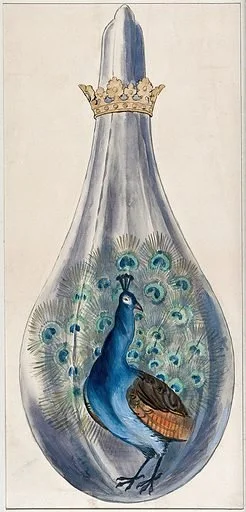The helpful formula, therefore, is spiritus contra spiritum. – C.G. Jung
In his 1961 letter to Bill W., one of the founders of Alcoholics Anonymous, Jung wrote that “The helpful formula, therefore, is spiritus contra spiritum.” – spirit against spirit. In addressing the problem of alcohol addiction in a former patient, Jung observed that “His craving for alcohol was the equivalent, on a low level, of the spiritual thirst of our being for wholeness”. Thus, Jung saw alcoholism as an attempt to lead a larger, more spirited life. Rather than view alcoholism from a purely pathological perspective, that is, as something to be cured, Jung holds that addiction, like all psychological symptoms, is a misguided attempt by the individual to fulfill an actual psychic need. If one only stopped the drinking (even if one could) without attending to that need, that lack of fulfillment would likely manifest in other ways, such as a new form of addiction, lack of spontaneity, depression and anxiety, or anger, frustration and bitterness to name a few.
Jung speaks to a basic human yearning for an experience of meaning, purpose and wholeness and to the emptiness, longing or dissatisfaction one can feel when that need is not satisfied. Our normal tendency is to look outside of ourselves to satisfy that need, be it new job, more money or a better sex life. That is, we tend to project or unconsciously place our wholeness and sense of self onto objects outside of ourselves, imagining that life will be better when we achieve them. And quite often it is, for striving, ambition and attaining goals are important. When we think these things will make us feel better and they ultimately don’t, and then we continue to assiduously and compulsively pursue them anyway, an addiction has formed. As something that initially made us feel good (food, sex, drugs) starts not to work anymore, we become more desperate, for to our minds, it is the only thing that offers us any hope of fulfilling the deep craving we can no longer bear to have unsated.
From a Jungian standpoint, compulsions (addiction is a form of compulsion) have a telos – an aim – for they indicate that a particular psychic imperative is not being met, similar to the way that anemia can indicate a need for more iron. The form of the compulsion points to the characteristic of the need attempting to be addressed. A sugar addiction, for example, might indicate a need for more sweetness in life, a sex addiction suggests that more intimacy and connection is sought. Compulsion is thus the psyches’ attempt to satisfy that larger experience of life that the whole of ourselves hungers for and our error is to mistake the concrete (e.g. alcohol) for the symbolic (spiritual fulfillment), the fool’s gold for the actual treasure. Addressing and containing addictive and compulsive behavior is important in order to curb the damage they inflict on one’s life, both concretely (physical health, relationship, job losses) and spiritually in order to create the space for healing to occur, but true healing lies only in deeply understanding the symbolic meaning of the compulsion and finding ways to live that out.
